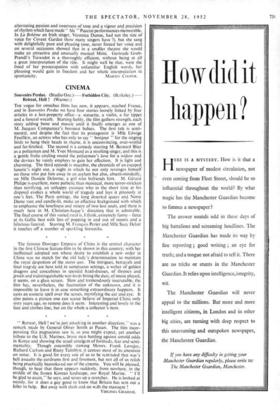CINEMA
Souvenirs Perdus. (Studio One.)—Forbidden City. (Berkeley.)— Retreat, Hell ! (Warner.) THE vogue for omnibus films has now, it appears, reached France, and in Souvenirs Perdus we have four stories loosely linked by four articles in a lost-property office—a statuette, a violin, a fur tippet and a funeral wreath. Starting feebly, the film gathers strength, each story adding bone and muscle until it finally emerges as one of M. Jacques Companeez's bonniest babies. The first tale is senti- mental, and despite the fact that its protagonist is Mlle Edwige Feuillere, an actress who has only to say" bonjour "for the singing birds to hang their heads in shame, it is unconvincing, over-wistful and far-fetched. The second is 'a comedy starring M. Bernard Blier as a policeman and M. Yves Montand as a strolling singer, and this is a gentle frolic circling round the policeman's love for a widow and the devices he vainly employs to gain her affection. It is light and charming. The third episode is macabre, the chronicle of an escaped lunatic's night out, a night in which he not only revenges himself on those who put him away in an asylum but also, absent-mindedly, on Mlle Daniele Delorme, a girl who befriends him. M. Gerard Philipe is excellent, more pathetic than maniacal, more terror-stricken than terrifying, an unhappy creature who in the short time at his disposal evokes a whole world of tragedy and lays it piteously at one's feet. The Paris settings, the long deserted quays and Notre Dame vast and candle-lit, make an effective background with which to emphasise the loneliness and misery of two lost souls, and there is much here in M. Christian-Jaque's direction that is admirable. The final course of this varied meal is, I think, extremely funny—farce at its Gallic best with 'lots of popping in and out of rooms and a hilarious funeral. Starring M. Francois Perier and Mlle Suzy Delair it touches off a number of sparkling fireworks.
The famous Dowager Empress of China is the central character in the first Chinese feature-film to be shown in this country, with her ineffectual adopted son whose desire to establish a new order in China was no match for the old lady's determination to maintain the royal despotism of the status quo. The intrigues, betrayals and final tragedy are here told in sumptuous settings, a welter of golden dragons and concubines in spendid head-dresses, of thrones and jewels and indistinguishable war-lords biting the dust, of music played, it seems, on a glass screen. Slow and tremendously inscrutable, the film has, nevertheless, the fascination of the unknown, and it is impossible to leave it in case something extraordinary happens. It casts an esoteric spell over the senses, mystifying the ear and eye. It also paints a picture one can scarce believe of Imperial China only sixty years ago, so remote does it seem. Interesting and lovely in the face and clothes line, but on the whole a collector's item.
-" Retreat, Hell ! we're just attacking in another direction," was a remark made by General Oliver Smith at Pusan. The film incor- porating this pugnacious saw is, as you might expect, yet another tribute to the U.S. Marines, brave men battling against untold odds in Korea and showing the usual amalgam of fortitude, fear and senti- mentality. Though ostensibly starting Messrs. Frank Lovejoy, Richard Carlson and Rusty Tamblyn, it centres most of its attention on noise. It is good for every one of us to be reminded that war's hell assaults the eardrums first and foremost, but not all of us relish being practically bazooka-ed out of the cinema. You will be pleased, though, to hear. that there appears suddenly, from nowhere, in the middle of the frozen Korean landscape, one Royal Marine. " I'll be glad to assist," he says, and seizes up a stretcher. He is looked at mistily, for it does a guy good to know that Britain has sent out a feller to help. But away with slush and on with the massacre ! 1
VIRGINIA GRAHAM.


































 Previous page
Previous page